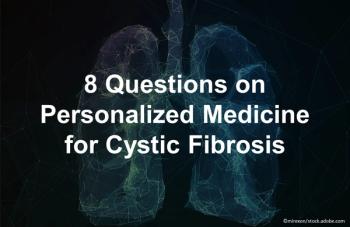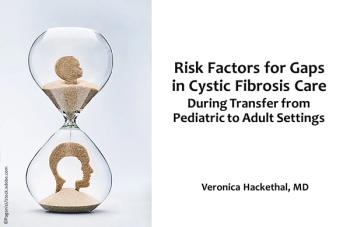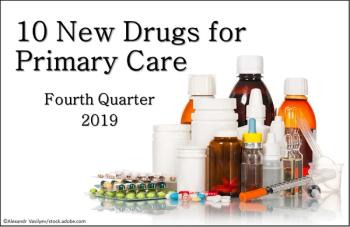
Working with Barriers to CF Treatment Adherence, the Fairview Way
Part II on CF medication adherence solutions at Fairview Health Services focuses on how the specialty pharmacy staff helps patients better manage barriers.
SPOTLIGHT ON FAIRVIEW HEALTH SERVICES PART II
According to the latest guidelines for cystic fibrosis (CF) published in U.S. Pharmacist, pharmacists are an important part of counseling patients with CF. The Fairview CF medication ahderence rate is
In
___________________________________
PC: What are some common reasons patients don’t take their medication or follow their treatment plans? Are there some solutions that tend to work generally, or is it more on an individual, case-by-case basis?
Dr Ehlert: I think there are a couple of common themes. A lot of it comes down to treatment burden. What we ask these patients to do every single day, just to maintain their health, is a lot. There's only so much we can do about that, but we can work with them, talk through their daily schedule and help figure out how best to incorporate things into their daily routine. We can ask a patient if there is something they are most likely to miss or forget or that they keep forgetting-is it a specific medication or does their schedule on a certain day of the week make it hard to fit in some aspect of care? How can we help that patient create a routine that is realistic for their life; that will fit their schedule so that they will be able to adhere to it?
"...there are a couple of common themes. A lot of it comes down to treatment burden."
Dr Ehlert: Sometimes the barrier may be patient expectations. The problem may be that the patient doesn’t fully understand how the medication is going to work and what it is actually doing for them or they don’t have realistic expectations for the treatment-and so they stop it. It’s not doing what they think it should be doing. I think that's becoming a big issue, particularly with the new CFTR modulators coming out.
"Sometimes the problem may be that the patient doesn’t fully understand how
the medication is going to work and what it is actually doing for them..."
An important piece of overcoming that barrier to adherence is upfront education. When a patient starts a new therapy, we need to make sure that they understand how it works and what to expect: Are there side effects? How will they feel? How long will it take to see/feel some kind of change? Will they actually notice anything different? So that if they say their life isn’t changing now that they started the new medication they will understand that it doesn’t mean the medication isn't working. We need to manage expectations.
Next:
Dr Ehlert: Another common barrier to taking medication as prescribed is medication access.
The patient may not be taking the medication because they or their family can't afford it. That’s a reality we see pretty often. There are a lot of different programs that are available to assist patients with those financial barriers. It is so important to have staff educated on what financial programs are out there for drugs specific to each disease state they work with.
Tim Affeldt, PharmD: All of these barriers to adherence are so important and are part of the reason why health systems are moving into the specialty pharmacy space. The specialty focus allows us to be so involved with our patients and that’s why adherence would be much better at our pharmacy versus a retail pharmacy, and at times versus even a national specialty pharmacy.
We have teams where that's all they do-work on removing financial barriers. I don't think you'll see that across all specialty pharmacies and certainly not in a retail pharmacy.
Dr ILL: Our patient financial advocates are trained in specific disease
states and they know the ins and outs of all the copay cards, the grants,
and so forth for the drugs that are commonly prescribed for those conditions.
Dr Ehlert: Also, when I work in clinic, I help all of our patients, not just the ones that use our own specialty pharmacy. Some patients, because of insurance restrictions, have to either use retail pharmacies or other national specialty pharmacies. I rarely receive any communication from a different specialty pharmacy that a patient is having adherence challenges or trouble affording their medication. It is so valuable to have that information and awareness here in one system and be able to intervene.
There is nothing more frustrating than seeing a patient in clinic, starting them on a new medication, and they come back for their 3-month follow-up and say they never started. “I didn't get it from my pharmacy,” or, “It was too expensive,” and that's 3 months that we've lost for that patient. That's a huge barrier to creating good care for these patients.
Next:
PC: Is there anything we haven't asked that you feel is important for our readers to know about your center, or the topic of CF non-adherence?
Dr Ehlert: One thing I would say, at least as it pertains just to CF, is it's helpful for people to understand that the medication adherence is only one piece of what these patients have to do to take care of themselves every day. In the pharmacy, of course, we're focused on the medications. But I think it's helpful to take a step back and appreciate that what we focus on all day is only one of the things that patients focus on. They have airway clearance therapy, and if they have diabetes, they're checking their blood sugar, managing their insulin. If they are struggling nutritionally, they may have to do tube feedings every night.
"... I think it's helpful to take a step back and appreciate that what we
focus onall day is only 1 of the things that patients focus on."
It's a lot, and it's easy sometimes to get frustrated with patients when they're not responding to phone calls or calling you back. You're reaching out to them, or they're calling at the last minute to order their 15 medications that they're going to be out of in 2 days. I think it’s important to maintain that awareness and empathy for patients and what they're dealing with.
One thing that I love about the Fairview specialty pharmacy, they had one of the pharmacy’s CF patients come and speak at an all-staff meeting. She talked about her daily routine and how she manages her disease and all of her treatments. She showed a picture of all the medications that she has to take every day.
"She showed a picture of all the medications
that she has to take every day."
I think that's really eye opening, because one thing that you do lose a little bit in the specialty pharmacy spaces is that face-to-face communication with patients-it’s much more outreach over phone, or e-mail or text message.
To have an actual patient come and share what their life is like, I think really helps deepen that level of understanding of what these people are dealing with every single day of their lives.
Part I of our interview:
More information on Fairview Health Services can be found on the organization's web site
Newsletter
Enhance your clinical practice with the Patient Care newsletter, offering the latest evidence-based guidelines, diagnostic insights, and treatment strategies for primary care physicians.

































































































































